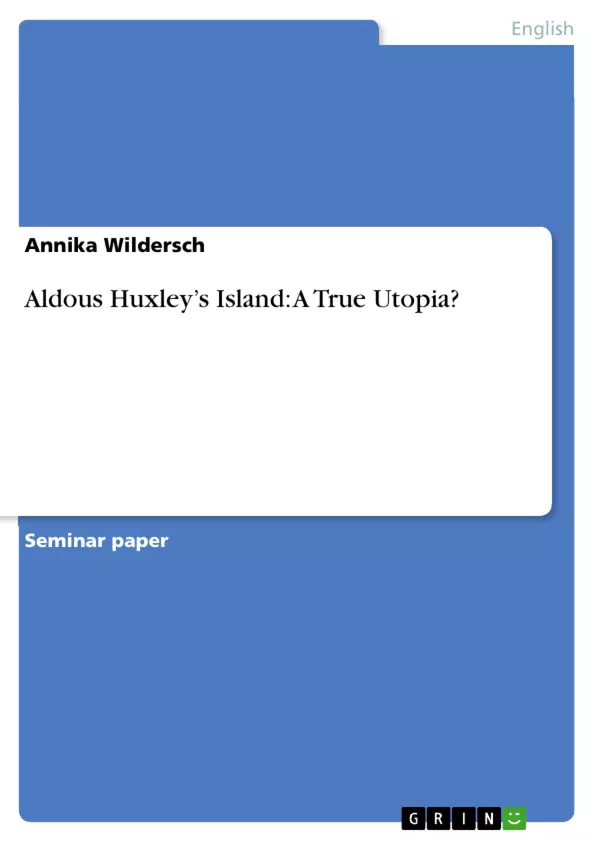1. Introduction
(...)
Island is a novel of ideas, light on the novel-part and heavy on the ideas. In fact it could also be seen as an essay with a bit of a plot entangled around it. The plot in any case is secondary and easy to summarize: The English journalist Will Farnaby is stranded on the island of Pala and is on the secret mission to negotiate a contract for oil. Injured in the beginning, he leads long conversations with some inhibitants through which he learns about the Palanese way of life. As he takes pleasure in their virtues and beliefs, he gives up his initial oil plans. Nevertheless, in the end Pala gets invaded by the neighbour island Rendang. The emphasis in Island lies in the long conversations that Will leads in which he learns about the Palanese lifestyle and through which we, the readers, get to know about Huxley’s ideas of an ideal society. The questions this research paper deals with are: What exactly are the utopian features in Island? Are those features attainable and what is more, are they worth to attain at all? And in this context, is Island rather a utopia of escape or reconstruction? In order to find out the answers to these questions, the paper will first offer an analysis of the ideas and then it will turn to the ‘novel’-part with an analysis of the main plot.
Table of Contents
- Introduction
- Huxley's ideas of a perfect society in Island
- Children and families
- Education and work
- Yoga and the moksha-medicine
- The beginning and end of Pala
- Conclusion
- Bibliography
Objectives and Key Themes
This research paper aims to explore the utopian features presented in Aldous Huxley's novel "Island." The analysis will delve into the attainability of these features and their inherent value. The paper will also consider whether "Island" should be classified as a utopia of escape or reconstruction. Key themes explored in the paper include:- Huxley's vision of an ideal society
- The role of individual freedom and happiness
- The importance of birth control and population management
- The impact of education, work, and societal structures on individual well-being
- The use of drugs and alternative therapies in achieving a harmonious state
Chapter Summaries
The introduction sets the stage by tracing the history of utopian literature, contrasting utopias of escape and reconstruction. The paper focuses on Aldous Huxley's "Island" as a utopian counterpoint to his earlier dystopian work, "Brave New World." The second chapter delves into Huxley's vision of an ideal society as depicted in "Island," examining the Palanese culture and their pursuit of happiness and individual freedom. The chapter analyzes key aspects of this society, including their system of birth control, education, and work practices. The third chapter examines the narrative elements of "Island," focusing on the story of Will Farnaby, an English journalist who is stranded on the island and learns about the Palanese way of life. The chapter explores the contrast between Palanese culture and the more conventional society represented by Farnaby's initial mission.Keywords
This research paper focuses on key themes related to utopian literature, including: utopia, dystopia, individual freedom, happiness, birth control, population management, education, work, societal structures, drugs, alternative therapies, and the Palanese society depicted in Aldous Huxley's "Island."- Citar trabajo
- Annika Wildersch (Autor), 2006, Aldous Huxley’s Island: A True Utopia?, Múnich, GRIN Verlag, https://www.grin.com/document/138836



